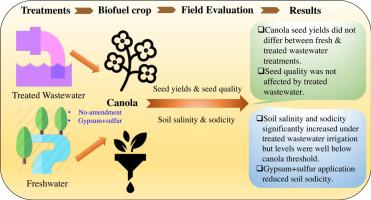Industrial Crops and Products ( IF 5.9 ) Pub Date : 2021-05-29 , DOI: 10.1016/j.indcrop.2021.113659 Vijayasatya N. Chaganti , Girisha Ganjegunte , Genhua Niu , April Ulery , Juan M. Enciso , Robert Flynn , Norman Meki , James R. Kiniry

|
Treated urban wastewater (TWW) is seen as a potential alternative for agricultural irrigation in arid west Texas region, due to scarcity of Freshwater (FW) supplies. However, TWW can potentially cause soil salinization and affect soil quality and crop productivity. Therefore, crops that are salt-tolerant and less water-intensive are needed to sustain agriculture in this region. Canola (Brassica napus L.) as an edible oilseed and biodiesel/biofuel crop, is salt-tolerant and relatively less water-intensive than crops that are traditional to this area. This two–year field study evaluated the performance of canola under TWW irrigation in terms of its seed yield potential and seed quality (oil content, oil yield and salt constituents), along with quantifying changes in soil salinity and sodicity. Experimental design included a randomized block split-plot with water quality (FW and TWW) as the main-plot and soil amendment (gypsum + sulfur and no-amendment) as the subplot factor. Results show that TWW application did not significantly affect canola seed yields in any of the two years. On average, seed yields were 1975 kg ha−1 across all treatments and years. Seed oil content, oil yield and mineral constituents were also not affected by TWW irrigation. Nevertheless, average seed oil content was 42 % and oil yield was 849 kg ha−1. Other than the effects on soil salinity and sodicity, Gypsum + Sulfur application did not influence canola seed productivity and quality. Changes in soil salinity and sodicity were more prominent under TWW irrigation but the levels were below the thresholds after two years. Gypsum + Sulfur application significantly reduced soil sodicity, especially in TWW irrigated soils. These results highlight that TWW can be successfully used to grow canola as a biofuel feedstock in this arid region while following appropriate soil management practices to alleviate sodicity hazard of TWW in the long-term.
中文翻译:

双低油菜籽作为生物燃料原料的产量响应和经过处理的城市污水灌溉和土壤改良剂应用下的土壤质量变化
由于淡水 (FW) 供应稀缺,经过处理的城市废水 (TWW) 被视为德克萨斯州西部干旱地区农业灌溉的潜在替代方案。然而,TWW 可能会导致土壤盐渍化并影响土壤质量和作物生产力。因此,需要耐盐且耗水量较低的作物来维持该地区的农业。油菜( Brassica napus)L.)作为食用油料种子和生物柴油/生物燃料作物,与该地区的传统作物相比,耐盐且耗水量相对较低。这项为期两年的田间研究评估了 TWW 灌溉下双低油菜籽在种子产量潜力和种子质量(含油量、油产量和盐分)方面的性能,同时量化了土壤盐度和碱度的变化。实验设计包括以水质(FW 和 TWW)为主地块,土壤改良剂(石膏 + 硫磺和未改良剂)作为次要地因子的随机区组裂区。结果表明,在这两年中的任何一年中,TWW 施用都没有显着影响油菜籽的产量。平均而言,种子产量为 1975 kg ha -1跨越所有治疗和年份。种子水含量,含油量和矿物成分也不受TWW灌溉的影响。尽管如此,平均种子油含量为 42%,油产量为 849 kg ha -1。除了对土壤盐分和碱度的影响外,施用石膏+硫磺并没有影响油菜籽的产量和品质。TWW灌溉下土壤盐分和碱度的变化更为突出,但两年后水平低于阈值。石膏 + 硫磺施用显着降低了土壤碱度,尤其是在 TWW 灌溉土壤中。这些结果突出表明,TWW 可以成功地用于在该干旱地区种植油菜作为生物燃料原料,同时遵循适当的土壤管理实践,以减轻 TWW 的长期碱度危害。



























 京公网安备 11010802027423号
京公网安备 11010802027423号